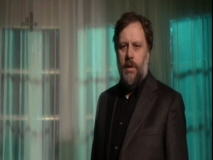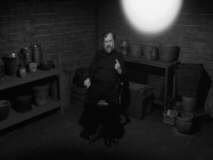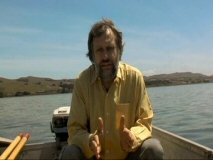The Pervertís Guide to Cinema (Sophie Fiennes, 2006)
 Sophie
Fiennesí The Pervertís Guide to Cinema features the entertaining
pontifications of pop philosopher Slavoj Zizek as applied to a slew of film
favorites. Less overtly sexual and decidedly more thoughtful than its salacious
title might imply, Fiennesí film takes a decidedly psychoanalytical approach
to understanding cinema. Zizekís Slovenian accent seems perfect for delivering
his Freudian interpretations, and heís thankfully not just presented as a
talking head. Rather, heís shot in poses that almost integrate him into the
films that heís discussing, seemingly theorizing from within the films
themselves. Those theories are hardly radical, but they are well organized, and
more often than not intriguing. Zizek discusses cinema as a form of conditional
belief. He tries to understand why we will ourselves to believe and be affected
by the flickering images on the movie screen. Repression and transgression are
the key themes of the films that he studies. In talking about this personal
canon, Zizek astutely discusses the complicity on the part of the audience, the
filmmakers who encode things to express what cannot be otherwise spoken about,
and the fictionalized characters, who are almost inevitably cross over into a
nether region of the subconscious. Fiennes uses a Rorschach blotch for some of
her scene transitions, and Zizek tries to turn every scene that he examines into
an opportunity to examine our collective subconscious.
Sophie
Fiennesí The Pervertís Guide to Cinema features the entertaining
pontifications of pop philosopher Slavoj Zizek as applied to a slew of film
favorites. Less overtly sexual and decidedly more thoughtful than its salacious
title might imply, Fiennesí film takes a decidedly psychoanalytical approach
to understanding cinema. Zizekís Slovenian accent seems perfect for delivering
his Freudian interpretations, and heís thankfully not just presented as a
talking head. Rather, heís shot in poses that almost integrate him into the
films that heís discussing, seemingly theorizing from within the films
themselves. Those theories are hardly radical, but they are well organized, and
more often than not intriguing. Zizek discusses cinema as a form of conditional
belief. He tries to understand why we will ourselves to believe and be affected
by the flickering images on the movie screen. Repression and transgression are
the key themes of the films that he studies. In talking about this personal
canon, Zizek astutely discusses the complicity on the part of the audience, the
filmmakers who encode things to express what cannot be otherwise spoken about,
and the fictionalized characters, who are almost inevitably cross over into a
nether region of the subconscious. Fiennes uses a Rorschach blotch for some of
her scene transitions, and Zizek tries to turn every scene that he examines into
an opportunity to examine our collective subconscious.
 Guideís
biggest failing, though, is that practically every film included in its line-up
could be considered a favorite. I couldnít help but wish there were a few
obscure films being discussed. Zizek sticks mostly to films that have already
had volumes written about them. Hitchcock or Lynchís films provide subject
matter for examining this subject matter, but theyíre also perfectly obvious
choices. By focusing specifically on great films heís able to more concretely
make his points, but itís difficult to imagine many cinephiles who donít
already understand that Lynch is largely concerned with overbearing parental
figures and that Hitchcock is obsessed with sexual repression. Zizek moves
beyond those obvious classifications, to be sure, but I was rather shocked that
out of the long list of films surveyed*, I have only failed to see one (Russian
musical Kubanskie Kazaki, for the record). While the accessibility of the
films chosen might mean that this film can introduce neophytes to film theory,
one canít help but feel that Zizek could have dug a little deeper into the
vaults.
Guideís
biggest failing, though, is that practically every film included in its line-up
could be considered a favorite. I couldnít help but wish there were a few
obscure films being discussed. Zizek sticks mostly to films that have already
had volumes written about them. Hitchcock or Lynchís films provide subject
matter for examining this subject matter, but theyíre also perfectly obvious
choices. By focusing specifically on great films heís able to more concretely
make his points, but itís difficult to imagine many cinephiles who donít
already understand that Lynch is largely concerned with overbearing parental
figures and that Hitchcock is obsessed with sexual repression. Zizek moves
beyond those obvious classifications, to be sure, but I was rather shocked that
out of the long list of films surveyed*, I have only failed to see one (Russian
musical Kubanskie Kazaki, for the record). While the accessibility of the
films chosen might mean that this film can introduce neophytes to film theory,
one canít help but feel that Zizek could have dug a little deeper into the
vaults.
 Guide clocks
in at about 2 1/2 hours, which is certainly not an insignificant amount of time,
but itís possible that it will leave you wishing for more when itís done.
Even if it might not be art on its own terms, this type of cinematic essay is an
ideal form of film criticism, since it can actually show film grammar instead of
merely describing it. Similar to Thom Andersonís Los Angeles Plays Itself or
Godard's Histoire(s) du cinema (the best I've seen in the genre), it is
likely to broaden your understanding of the films it covers, or at least stir
some fond memories of your favorites. Taken as a whole, Zizekís work here
justifies itself. Even though some of his analysis is so textbook as to feel
like common knowledge, his choice in film clips to back up his assertions is
impeccable. When heís firing on all cylinders, such as when he examines a
series of voyeuristic characters peering through cracks or when he turns his
analytical powers on Psycho, he brings new life to the films he
discusses.
Guide clocks
in at about 2 1/2 hours, which is certainly not an insignificant amount of time,
but itís possible that it will leave you wishing for more when itís done.
Even if it might not be art on its own terms, this type of cinematic essay is an
ideal form of film criticism, since it can actually show film grammar instead of
merely describing it. Similar to Thom Andersonís Los Angeles Plays Itself or
Godard's Histoire(s) du cinema (the best I've seen in the genre), it is
likely to broaden your understanding of the films it covers, or at least stir
some fond memories of your favorites. Taken as a whole, Zizekís work here
justifies itself. Even though some of his analysis is so textbook as to feel
like common knowledge, his choice in film clips to back up his assertions is
impeccable. When heís firing on all cylinders, such as when he examines a
series of voyeuristic characters peering through cracks or when he turns his
analytical powers on Psycho, he brings new life to the films he
discusses.
56
Jeremy Heilman
08.22.06
*For the record, the list of films covered is:
Alice in Wonderland (1951)
Alien
Alien Resurrection
The Birds
Blue Velvet
City Lights
The Conversation
Dead of Night
Dr. Strangelove
Dogville
Duck Soup
Dune
The Exorcist
Eyes Wide Shut
Fight Club
Frankenstein
The Great Dictator
Ivan the Terrible: Part 2
Kubanskie Kazaki
Lost Highway
The Matrix
Monkey Business (1931)
Mulholland Dr.
North By Northwest
Persona
The Piano Teacher
Plutoís Judgment Day
Possessed (1931)
Psycho
Rear Window
The Red Shoes
Saboteur
Solaris (1972)
Stalker
Star Wars: Episode III: Revenge of the Sith
The Ten Commandments (1956)
The Testament of Dr. Mabuse
Three Colors: Blue
To Catch a Thief
Vertigo
Wild at Heart
The Wizard of Oz (1939)